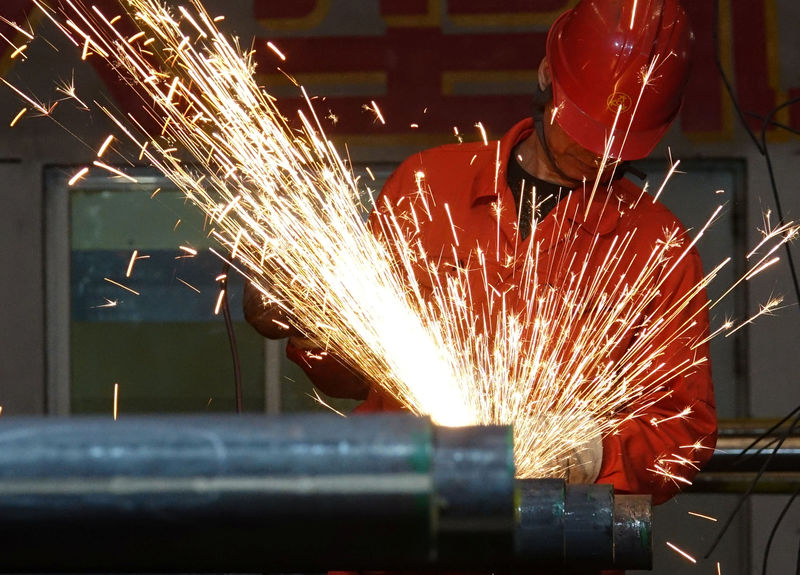BEIJING (Reuters) - China's manufacturing activity expanded at its weakest pace in four months in March as export demand faltered, prompting companies to shed staff more quickly as they looked to cut costs, a private survey showed on Monday.
The Caixin/Markit Manufacturing Purchasing Managers' index (PMI) fell to 51.0 in March from February's 51.6, countering economists' expectations for a slight uptick to 51.7.
While the index remained above the 50-point mark that divides growth from contraction on a monthly basis, it was the weakest reading since November and signaled only a marginal improvement in operating conditions at the end of the first quarter.
The findings contrasted with official data on Saturday, which showed manufacturing growth picked up more than expected in March in response to stronger domestic and overseas demand. The two reports often diverge, possibly due to differences in the number and type of businesses surveyed.
The Caixin PMI, which tends to focus on smaller firms, suggested output and new orders grew only modestly in March, with growth in export orders slumping to a 10-month low even as fears grow of a possible trade war between the United States and China.
The survey cited subdued foreign demand, and did not mention if there had been any impact yet from escalating trade tensions.
The Trump administration slapped hefty tariffs on steel and aluminum imports last week and then targeted China specifically by announcing plans for additional tariffs of up to $60 billion of Chinese goods, which are expected to focus largely on its tech and telecommunications products.
A resurgent yuan could also be weighing more on smaller exporters. The Chinese currency has gained more than 3 percent against the U.S. dollar this year, on top of a 6.7 percent rise in 2017.
Chinese manufacturers also continued to reduce headcounts in March to cut costs, with the rate of job shedding still modest but the quickest since last August, the survey showed.
"Overall, the manufacturing PMI reading in March showed that demand was not as strong as expected, leading to lower willingness of manufacturers to produce and restock," Zhengsheng Zhong, Director of Macroeconomic Analysis at CEBM Group, said in a note accompanying the release.
"However, the ability of manufacturers to make a profit was beefed up by the stable increase in new orders and the much slower jump in input costs."
Input price inflation continued to cool, hitting a nine-month low, while firms raised their selling prices at a slightly quicker pace than the previous month.
But many businesses appear to believe the weakness in March orders was only a soft patch, with optimism about the one-year outlook picking up to the highest in a year, underpinned by expectations that greater investment, improved market conditions and new products will all help to boost demand.
Overall, China's economic data so far this year suggest the economy has carried solid growth momentum into the first quarter from last year, with a government think tank forecasting the economy will grow 6.9 percent in the first half.
But economists are sticking to forecasts that China's pace will slow to around 6.5 percent by the end of the year, weighed down by the cooling property market and rising borrowing costs, even if there are no global trade shocks.
"The growth momentum of the Chinese manufacturing economy may have weakened in March, but at a marginal pace," said CEBM Group's Zhong.
China is aiming for economic growth of around 6.5 percent this year, the same target as in 2017, while pressing ahead with its campaign to reduce risks in the financial system, Premier Li Keqiang said in March.

(This story has been refiled to correct day of week in first paragraph)